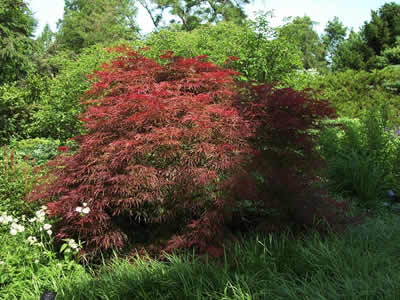Garnet Japanese Maple |
|
|
Sapindaceae Acer Palmatum Var. Dissectum Garnet |
|
| Price |
|
| Availability and Options |
Temporarily Out Of Stock This product is temporarily out of stock. Restocks typically occur at the beginning of each week. Check back soon and sorry for the inconvenience! |
| Shipping Information | |
| Grows In | Zone 6A · -10° to -5° F through Zone 9B · 25° to 30° F |
| Sun Exposure | Morning Sun / Evening Shade, Dappled Light / Filtered Sun |
| Soil Drainage | Well Drained |
| Resistent To | Deer Resistant |
| Blooms | Fall Foliage, Spring Foliage, Summer Foliage |
| Foliage Color | Burgundy, Red |
| Average Height | 6' to 8', 8' to 10', 10' to 12' |
| Average Width | 6' to 8', 8' to 10', 10' to 15' |
| Attracts | Visual Attention |
| Fragrances | None |
Gardener Direct offers over 150 outstanding and unique varieties of Japanese Maple. We are testing and adding new varieties every year. Our container-grown maples are expertly grown from grafts with the utmost care. Before we offer them for sale, plants are fully rooted and well-branched in 2, 3 or 5 gallon containers.
To determine hardiness and overall performance in the landscape, each variety of Japanese Maple has been field-tested in our trial gardens here in mid-Georgia. This means you can count on the specific information we provide about each plant.
 More About Garnet Japanese Maple...
More About Garnet Japanese Maple...'Garnet' is one of the top selling Japanese maples ever. It has been popular around the world for many decades. Its filigree leaves are deeply cut and dissected, hence its name. They look like giant snowflakes cut in pieces and densely cover even young plants. The color show begins with vibrant red in the spring, turning crimson red in early summer and deep burgundy in late summer, finishing up with vivid reddish-purple in the autumn.
It grows slowly and forms a shrub that is rather wider than tall. Branches are pendent making an umbrella appearance. It is often grafted on short stems or half-standards so you can fully enjoy its drooping branches. It needs light, acidic, well drained soil that will retain moisture.
When provided the right environment in the landscape Japanese Maples are very easy to grow and care for, and long lived.
Soil - Japanese maples adapt well to many soil types provided there is good drainage. Consistently wet or soggy soils can be a killer.
Sun - Some varieties will tolerate full sun. However, in their natural habitat, Japanese Maples are understory trees, growing in dappled forest sunlight and at the edges of partially shaded woodlands. Ideally they prefer to be grown in similar conditions, especially in the warmer climate of the Deep South.
Pruning - When a specific variety of Japanese maple is planted in the right size space; where it have room to grow to mature size, rarely will it require pruning. That beings said, removal of damaged or stray branches that spoil the form of the tree can be performed almost any time of year. Heavy or major pruning is best left to professionals. If you hire someone to prune your Japanese maple make sure he/she has the credentials and ALWAYS check references.
Water - During the first two summers after planting a Japanese Maple, make sure to water enough to keep soil damp but not soggy. Constantly wet feet can cause serious problems. Proper planting method can ensure proper drainage over the long term.
SEE: Detailed Planting Instructions For How To Plant A Japanese Maple in the Ground
